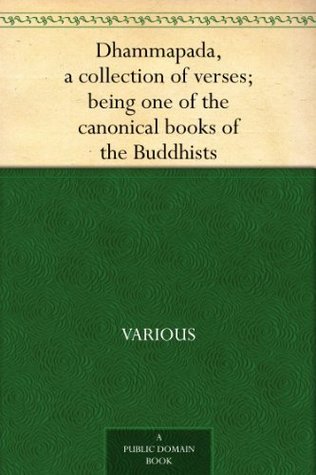More on this book
Community
Kindle Notes & Highlights
by
Anonymous
Read between
November 9 - November 9, 2017
1. All that we are is the result of what we have thought: it is founded on our thoughts, it is made up of our thoughts. If a man speaks or acts with an evil thought, pain follows him, as the wheel follows the foot of the ox that draws the carriage. 2. All that we are is the result of what we have thought: it is founded on our thoughts, it is made up of our thoughts. If a man speaks or acts with a pure thought, happiness follows him, like a shadow that never leaves him.
19. The thoughtless man, even if he can recite a large portion (of the law), but is not a doer of it, has no share in the priesthood, but is like a cowherd counting the cows of others. 20. The follower of the law, even if he can recite only a small portion (of the law), but, having forsaken passion and hatred and foolishness, possesses true knowledge and serenity of mind, he, caring for nothing in this world or that to come, has indeed a share in the priesthood.
Earnestness is the path of immortality (Nirvana), thoughtlessness the path of death. Those who are in earnest do not die, those who are thoughtless are as if dead already.
Let the wise man guard his thoughts, for they are difficult to perceive, very artful, and they rush wherever they list: thoughts well guarded bring happiness.
If a traveller does not meet with one who is his better, or his equal, let him firmly keep to his solitary journey; there is no companionship with a fool.
127. Not in the sky, not in the midst of the sea, not if we enter into the clefts of the mountains, is there known a spot in the whole world where death could not overcome (the mortal).
141. Not nakedness, not platted hair, not dirt, not fasting, or lying on the earth, not rubbing with dust, not sitting motionless, can purify a mortal who has not overcome desires. 142. He who, though dressed in fine apparel, exercises tranquillity, is quiet, subdued, restrained, chaste, and has ceased to find fault with all other beings, he indeed is a Brahmana, an ascetic (sramana), a friar (bhikshu).
145. Well-makers lead the water (wherever they like); fletchers bend the arrow; carpenters bend a log of wood; good people fashion themselves.
Let each man direct himself first to what is proper, then let him teach others; thus a wise man will not suffer.
Let no man ever look for what is pleasant, or what is unpleasant. Not to see what is pleasant is pain, and it is pain to see what is unpleasant. 211. Let, therefore, no man love anything; loss of the beloved is evil. Those who love nothing and hate nothing, have no fetters.
This is an old saying, O Atula, this is not only of to-day: `They blame him who sits silent, they blame him who speaks much, they also blame him who says little; there is no one on earth who is not blamed.' 228. There never was, there never will be, nor is there now, a man who is always blamed, or a man who is always praised.
...more
For self is the lord of self, self is the refuge of self; therefore curb thyself as the merchant curbs a good horse.


